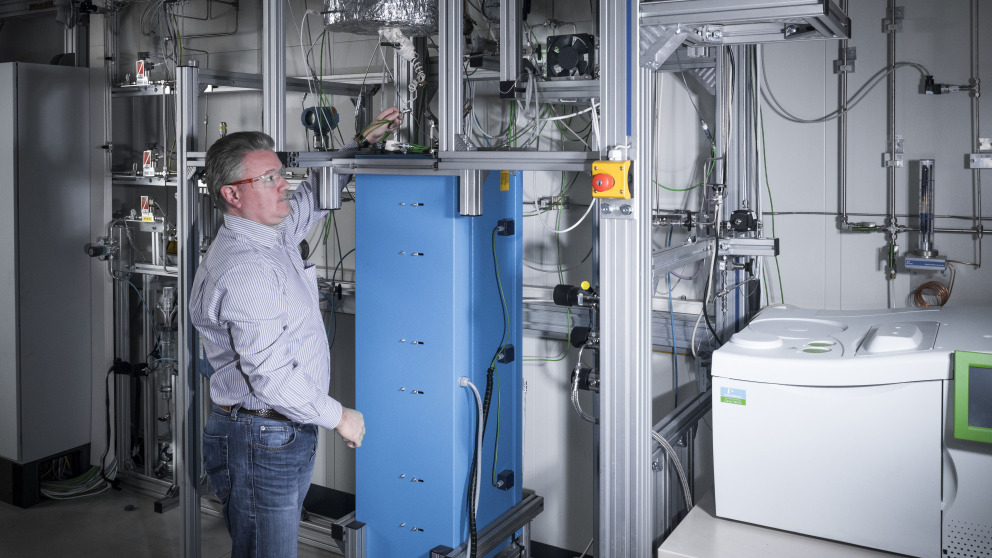Zero-Emission Hydrogen Production from Natural Gas: German Gas Industry Awards Prize to Researchers in Karlsruhe and Potsdam for Groundbreaking Process.
29.11.2018
A new technology developed in a joint research project by scientists at Karlsruhe Institute of Technology (KIT) and the Institute of Advanced Sustainability Studies (IASS) promises to provide energy from natural gas without producing harmful CO2 emissions. The process converts natural gas, which consists primarily of methane, into hydrogen and solid carbon. The researchers have been recognized for their work with the Innovation Award of the German Gas Industry.

“The Innovation Award of the German gas industry for the new methane decomposition process is proof of the innovative spirit of our scientists,” says KIT president, Professor Holger Hanselka, on the occasion of the award ceremony. “The ability to use fossil natural gas in the future without harming the climate could make a decisive contribution to the development of a CO2-neutral energy system. I am very pleased that, as a research university in the Helmholtz Association, we have been able to make this important contribution to climate protection together with our partners.” The Innovation Award of the German Gas Industry was won by a team of researchers from Karlsruhe Institute of Technology (KIT) and the Institute of Advanced Sustainability Studies (IASS) in Berlin on 22 November. The award ceremony was held under the patronage of the Federal Minister of Education and Research, Anja Karliczek.
The new process makes it possible to use natural gas without harming the climate. “Instead of directly burning the natural gas, which mainly consists of methane, we separate it into its constituents: hydrogen and carbon,” says Dr Stefan Stückrad, who led the research project at the IASS. The hydrogen produced in this process can be used as an energy carrier in fuel cell vehicles and for the generation of electricity and heat, and can also be used in the chemical industry. “Most of the hydrogen currently used in the chemical industry is produced from natural gas by steam reforming of methane – a process that releases considerable amounts of carbon dioxide,” says Stückrad. The new process, which is also referred to as ‘methane cracking’, also produces a very pure, pulverulent carbon as a by-product. This increasingly valued industrial raw material is used in the production of elastomers, lightweight construction materials, printing inks and even batteries.
Methane cracking is not a fundamentally new idea and has previously been experimentally investigated in gas phase reactors. “Conventional methods are unsuitable for industrial scale applications,” says Professor Thomas Wetzel of the Institute for Thermal Process Engineering (TVT) at KIT. “The carbon that accumulates during cracking deposits as a solid layer on the heated reactor walls and clogs the reactors within a short time. Other approaches using arc- and plasma-based reactors have also proved unsuccessful.” The research project at IASS and KIT took a fundamentally different approach to achieving the continuous pyrolytic cleavage of methane that uses molten tin as a heat transfer and liquid medium in a bubble column reactor. In the process methane gas is continuously introduced from below into a liquid metal column maintained at up to 1,200 degrees Celsius, where it rises to the surface as a swarm of bubbles. The gas in the bubbles reaches the reaction temperature very quickly, resulting in a pyrolysis reaction. “At the surface of the liquid tin, the bubbles open and release the gaseous hydrogen and the carbon,” says Wetzel. “The carbon accumulates as a micro-granular powder, which can be easily separated from the gas stream and handled.”
This new process also makes it possible to operate a methane-splitting reactor on a continuous basis. On a laboratory scale, a conversion rate of up to 78 percent has already been demonstrated. The research groups are now working to optimize and scale up the process to develop a pilot-scale plant.
The team
This research project on methane cracking was initiated by Nobel Laureate Professor Carlo Rubbia, who is also a former scientific director of the IASS. The project was coordinated at the IASS by Dr Stefan Stückrad and Professor Alberto Abánades. In Karlsruhe, researchers from the Karlsruhe Liquid Metals Laboratory (KALLA), the Institute for Pulsed Power and Microwave Technology (IHM) and the Institute for Applied Materials (IAM) are contributing to the project, coordinated by Professor Thomas Wetzel from the Institute of Thermal Process Engineering (TVT), Dr Leonid Stoppel (KALLA) and Dr. Alfons Weisenburger (IHM).
The Innovation Award of the German Gas Industry
The Innovation Award is presented every two years by the Association for the Efficient and Environmentally Friendly Use of Energy (ASUE) in partnership with the German Technical and Scientific Association for Gas and Water (DVGW), the German Association of Energy and Water Industries (BDEW) and the industry initiative Zukunft ERDGAS. The prize, which aims to recognize developments and concepts that prove to be exceptionally innovative for industry, trade, or science, is awarded across four categories. The IASS/KIT project won the Innovation Award in the category “Research & Development”.